Pro.Chu Zhaohui:Danish Folk Højskole:“Adult’s nursery”
Chu Zhaohui:Danish Folk Højskole:“Adult’s nursery”
Pro. Chu Zhaohui/储朝晖, famous Chinese Educator
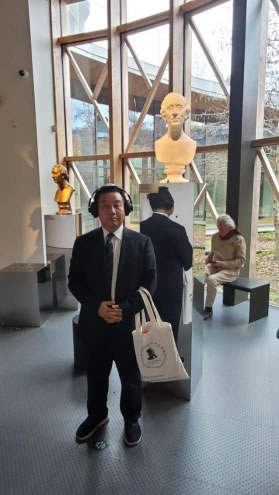
When it comes to Denmark, what comes to mind? Hans Christian Andersen's fairy tales may be its most iconic calling card, but the education system nurtured by its unique culture and social institutions also offers a window into its ethos.
At the end of 2024, I accompanied several recipients of the Hans Christian Andersen Teacher’s Award on a visit to Denmark, seeking pathways for educational exchange between China and Denmark. I observed that despite significant differences in natural conditions, historical culture, economic status, social systems, and educational frameworks, both nations share a profound emphasis on education. Among visits to Danish kindergartens, primary schools, and Folk Højskole, the latter—often described as "nurseries for adults"—left the deepest impression.
Origins and Functions of Danish Folk Højskole
Unique to Denmark and rare elsewhere, Folk Højskole represent a distinctive educational model. They are neither high schools nor universities but institutions bridging the two, primarily enrolling students aged 16 to 19. With no admission requirements, no formal diplomas awarded, and flexible study durations ranging from weeks to months, their educational purpose is to "enlighten lives."
In 1844, Danish educational philosopher N.F.S. Grundtvig founded the first folk high school. Subsequent institutions and their systems evolved from his vision. Grundtvig believed learning should "enhance cultural literacy and life fulfillment." Guided by this philosophy, he established three missions for these schools: enlightening lives, nurturing citizens, and fostering lifelong learning. As Grundtvig told students: "I do not seek to change you, but to light a lamp in your heart. You bring your unique life experiences; the school is merely a space to share them. Everyone is inherently good—the school’s role is to help individuals refine themselves." This ethos remains central to Danish Folk Højskole.
Historically, these institutions have profoundly shaped Danish education and cultivated traits such as simplicity, peacefulness, integrity, compassion, creativity, and responsibility. These qualities have become embedded in Denmark’s sociocultural DNA, contributing to its high happiness index, innovative spirit, and social harmony.
Folk Højskole prioritize not skill acquisition but guiding students to coexist with society while achieving self-improvement. They champion lifelong learning, communion with nature, and awakening self-awareness. "What matters is not mastering skills, but gaining self-confidence, passion, mutual aid, and a sense of civic value and social responsibility."
This focus on individual growth earns Folk Højskole the nickname "nurseries for adults." Every adult faces moments of doubt—these schools aim to help them rediscover themselves, find purpose, and regain confidence. Their influence extends across Scandinavia and beyond, with over 400 such institutions in Denmark, Norway, Sweden, the UK, and the Americas. Notable figures, including Martin Luther King Jr., have studied at Folk Højskole, underscoring their enduring global impact.
Danish Folk Højskole Help Passive and Confused Students Find Themselves
The Danish Folk Højskole I visited had no walls, gates, or slogans. They were clean, simple, surrounded by lush gardens, and equipped with excellent facilities. Operated by private organizations with government funding, every admitted student receives financial support from the Danish government. Each school focuses on distinct themes, such as sports, music, environmental protection, or advocating a free lifestyle. Students come from around the world, including older applicants and even university students seeking new experiences.
Danish Folk Højskole require boarding and enforce strict 25-minute lunch and dinner schedules. Everyone eats together, fostering conversation and discouraging early departures. Teachers explain this practice helps students integrate into the community, build face-to-face connections, and develop healthy routines. After meals, principals, teachers, or students ring bells to share announcements, award certificates to outstanding students, or host activities like sharing reflections, group singing, or poetry readings by instructors.
Daily life is managed by student-led self-governing bodies. Those elected to handle tasks like meal preparation or cleaning take pride in their roles, cheered on by peers. Danes view cooking as life itself, and these schools prioritize teaching students to live meaningfully and serve others.
Students typically attend for about 10 months, with diverse goals: pursuing knowledge, learning languages, making international friends, gaining practical skills, focusing on health, or simply relaxing. Some arrive after losing their way in life, hoping to rediscover their path. Many report transformative experiences, awakening their potential and igniting dreams through interactions with teachers and peers.
The Future of Danish Folk Højskole
These schools not only provide continuing education and self-improvement opportunities but also foster cross-cultural exchange among students from varied social and cultural backgrounds. However, such high-quality resources remain underutilized.
Most schools I visited had only around 40 students, with some closing due to low enrollment. In 1986, Denmark had 107 Folk Højskole, but smaller institutions with 20 or fewer students were gradually merged or shut down. Today, 66 remain, with enrollments ranging from 50 to 200.
Declining enrollment may relate to Denmark’s small population of under 6 million. Yet, these schools also admit international students, who receive Danish government subsidies. This positions them as potential hubs for global education and cultural exchange while guiding students through life’s uncertainties.
Indeed, Danish Folk Højskole have attracted students and teachers worldwide, including Chinese learners. Multicultural interactions enhance language skills, broaden perspectives, and teach equality and friendship. However, it’s crucial to note these schools do not offer degree programs. Some agencies misleadingly market them as “language schools” or “university prep courses,” leading to misunderstandings and high agency fees.
2025 marks the 75th anniversary of China-Denmark diplomatic relations. I believe Danish Folk Højskole can expand bilateral educational exchanges. Their vitality and growth will depend on embracing multicultural dialogue and collaboration.
*(This article was originally published in the *China Education Daily* on May 13, 2025. Author: Chu Zhaohui, a researcher at the China National Institute of Education Sciences. As an education expert invited by the Andersen Teacher’s Award Nordic Education Study Tour, Professor Chu has conducted extensive research on Danish and German education and published numerous analyses of Danish educational philosophies in media outlets.)*
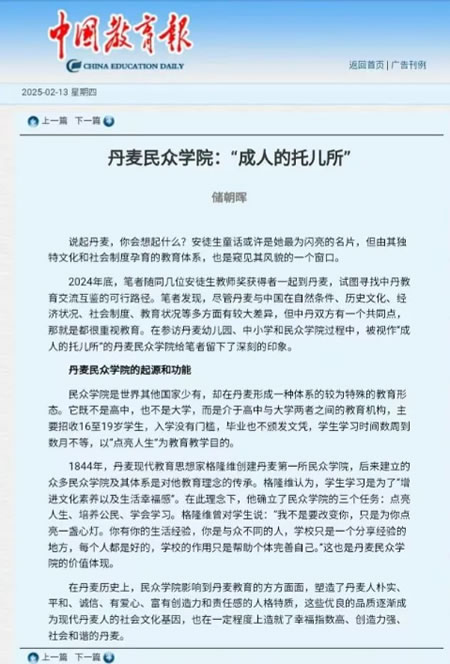
丹麦民众学院:“成人的托儿所”
储朝晖 安幼
说起丹麦,你会想起什么?安徒生童话或许是她最为闪亮的名片,但由其独特文化和社会制度孕育的教育体系,也是窥见其风貌的一个窗口。
2024年底,笔者随同几位安徒生教师奖获得者一起到丹麦,试图寻找中丹教育交流互鉴的可行路径。笔者发现,尽管丹麦与中国在自然条件、历史文化、经济状况、社会制度、教育状况等多方面有较大差异,但中丹双方有一个共同点,那就是都很重视教育。在参访丹麦幼儿园、中小学和民众学院过程中,被视作“成人的托儿所”的丹麦民众学院给笔者留下了深刻的印象。
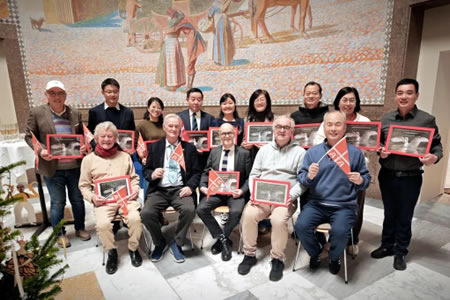
丹麦民众学院的起源和功能
民众学院是世界其他国家少有,却在丹麦形成一种体系的较为特殊的教育形态。它既不是高中,也不是大学,而是介于高中与大学两者之间的教育机构,主要招收16至19岁学生,入学没有门槛,毕业也不颁发文凭,学生学习时间数周到数月不等,以“点亮人生”为教育教学目的。
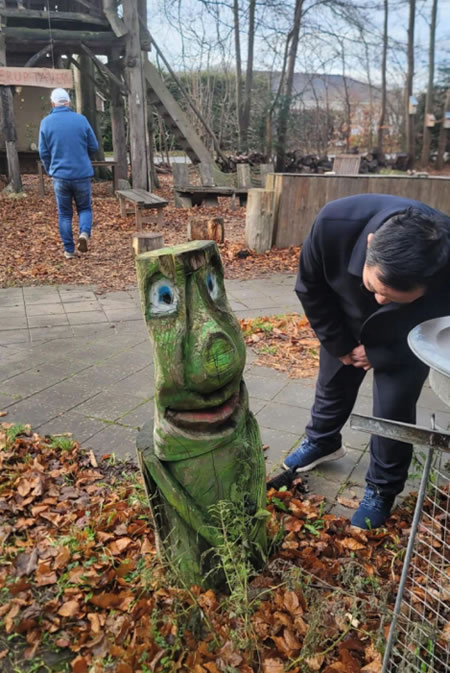
1844年,丹麦现代教育思想家格隆维创建丹麦第一所民众学院,后来建立的众多民众学院及其体系是对他教育理念的传承。格隆维认为,学生学习是为了“增进文化素养以及生活幸福感”。在此理念下,他确立了民众学院的三个任务:点亮人生、培养公民、学会学习。格隆维曾对学生说:“我不是要改变你,只是为你点亮一盏心灯。你有你的生活经验,你是与众不同的人,学校只是一个分享经验的地方,每个人都是好的,学校的作用只是帮助个体完善自己。”这也是丹麦民众学院的价值体现。
在丹麦历史上,民众学院影响到丹麦教育的方方面面,塑造了丹麦人朴实、平和、诚信、有爱心、富有创造力和责任感的人格特质,这些优良的品质逐渐成为现代丹麦人的社会文化基因,也在一定程度上造就了幸福指数高、创造力强、社会和谐的丹麦。

丹麦民众学院的教学,不是为了让学生掌握某种技能或知识,而是为了帮助学生学会如何与社会共处,实现自我完善和提升。民众学院提倡终身学习,亲近自然,激发每个人的自我意识,“重要的不是学到某种技能,而是通过学习学会自信、热爱、互助,以及作为公民的价值和社会责任感”。
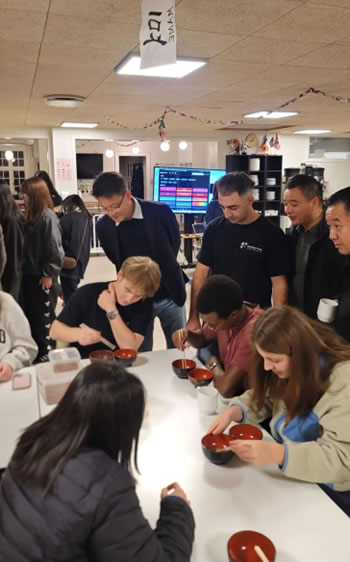
正因为对学生个体的关注,丹麦民众学院被称为“成人的托儿所”。每一个成人都难免有失意迷茫的时候,民众学院的基本任务是帮助他们认识自我、找准定位,进而重拾生活的信心。丹麦民众学院在北欧乃至世界范围内都具有广泛影响。丹麦、挪威、瑞典、英国以及美洲大陆,总计约有400多所民众学院,包括马丁·路德·金在内的许多知名人士都曾在民众学院接受教育。
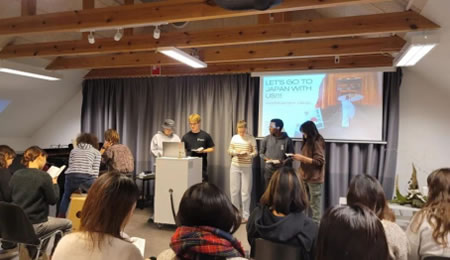
丹麦民众学院让被动迷茫的学生找到自己
笔者参访的几所丹麦民众学院,都没有围墙、校门和标语,整洁简明,园林盎然,设施优良。丹麦民众学院由私人机构组织教学,政府提供资金支持,每位获得入学许可的申请者都能得到丹麦政府的资助。学院课程各有侧重,体育、音乐、环保或是倡导自由的生活方式。学生来自世界各地,还有一些年龄较大、已经在大学就读的人提交学习申请。
丹麦民众学院实行住宿制,有严格的午餐和晚餐时间规定,时间为25分钟,所有人都聚在一起吃饭、交流,不鼓励提前离开。据学院教师介绍,这是为了帮助学生融入集体,有更多与他人当面交流的机会,并帮助不按时吃饭的学生养成良好生活习惯。用餐后,校长、教师或学生会摇铃通知注意事项,为表现优异的学生颁发奖状,学生发表自己的学习所得,或大家一起唱歌,或由教师为大家读诗。
丹麦民众学院的日常生活由学生组成的自治组织安排实施。被推选出来负责餐食准备、餐盘清洁等事务的学生会非常开心,其他学生会以热烈掌声予以激励。在丹麦人看来,做饭就是生活,民众学院首先就是教你学会生活,为他人服务。
前往丹麦民众学院学习的学生,学习时间一般为10个月左右,学习目的不尽相同,有为求知而来,有为学语言而来,有为交各国朋友而来,有为掌握实际技能而来,有为健康养生而来,有为放松心情而来。也有人曾经走错了人生路,来这儿重新找寻人生方向。学生们表示,在这儿的学习体验不错。在与老师和其他同学的共处中,不少学生唤醒了自我的潜能,点燃了梦想和追求。
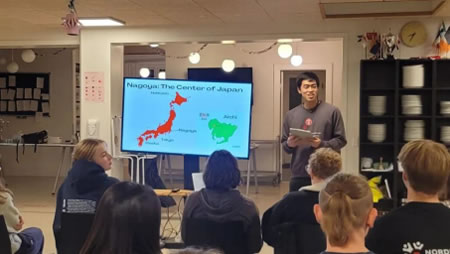
丹麦民众学院何去何从
丹麦民众学院不仅为学生提供了继续教育和自我提升的机会,也促进了不同社会和文化背景的学生和群体的交流与融合。但让人惋惜的是,这么优质的教育资源目前还没有得到充分利用。
笔者到访的几所丹麦民众学院大都只有40名左右的学生,有民众学院因学生不足而关门。1986年,丹麦开设民众学院107所,此后,一些学生人数在20左右的小规模学院逐渐被撤并。如今丹麦尚存有66所民众学院,学生人数从50人到200人不等。
丹麦民众学院生源的减少,或许与丹麦人口不到600万有关。不过,丹麦民众学院可以招收境外学生,这些境外学生同样能获得丹麦政府的经费补助,或许未来在帮助学生走出人生迷茫期的同时,也可以成为国际教育和人文交流的重要载体。
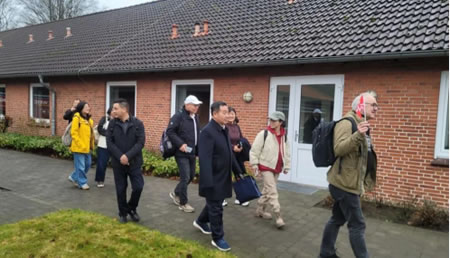
事实上,丹麦民众学院已经吸引了不少国家的学生和教师前来,也曾有中国学生在这里学习。跨文化背景的学生们聚集在一起,不仅有助于语言能力的提升,还能开阔视野,学会平等相助、友好交往。但需要注意的是,丹麦民众学院并非学历教育,一些中介机构却将其宣传为“语言学校”或“大学预科课程”,导致申请者产生误解并缴纳高额中介费。
今年是中丹建交75周年,笔者相信丹麦民众学院可以为双方教育交流互鉴提供更加广阔的空间。而丹麦民众教育的繁荣和发展,也离不开多元文化的碰撞和交融。
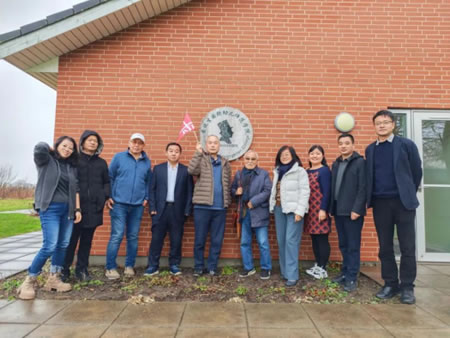
(本文原发表于2025念月13日《中国教育报》,作者:储朝晖 系中国教育科学研究院研究员。作为安徒生教师奖北欧教育考察团特邀教育专家,储教授对丹麦德国的教育做了详细的研究,已经在众多媒体发表了他对丹麦教育理念的解读。)
请随我走进安徒生童话世界里

放飞童心远,安幼润天下



